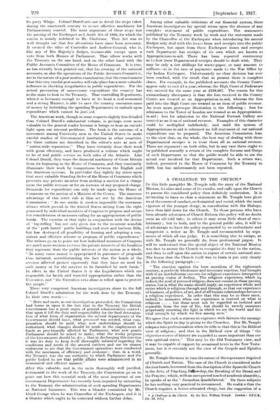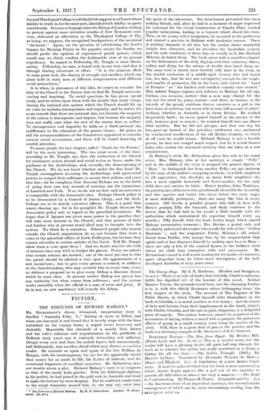A CHALLENGE TO THE CHURCH.
IN this little pamphlet Mr. Temple tells the story of the National Mission, its aims and some of its results, anti calls upon the Church to pursue the considered policy then definitely undertaken. It is interesting to have so clear a statement as Mr. Temple here gives us of the course of conduct, ecclesiastical and racial, which time most vigorous of the younger clergy, in consultation with the Bishops, have thus laid down for the Church. To those persons who have been already advocates of Church Reform this policy will no doubt seem an oft-told tale; to others it may seem little short of revo- lutionary; but to both, and to the general public also, it will be of advantage to have the policy expounded by no enthusiastic and competent a writer as Mr. Temple and recommended by argu- ments of which all can judge. It is something also to escape, as with Mr. Temple see generally do, from professional jargon. It will be understood that the special object of the National Mission was first to arouse the Church to recognize its duty to the nation, and then to call upon the nation to repent of certain national sine. The lesson that the Church itself was to learn is put very clearly in the following paragraph ;—
The reaction against the tare moralism of the eighteenth century, a perfectly wholesome and necessary reaction, had brought with it an unwholesome concern for religious experience interpreted as passing states of feeling. The religious experience, which be indeed, the soul of personal religion, does not consist in these passing states, but is what the name should imply, an experience whole and entire which is' religious through and through, so that our experience of business, of politics, of art, and of off human relationships ',Kamm a religious' experience. In order that this may be so there must, indeed, be moments when our experience is centred on what is religious . . . but these most not be regarded as isolated and separable from the rest of life, but should be merely momenta perpetually renewing the light in which we see the world and the vital strength by which we live among men."
We agree that such a statement expresses with fairness the message which the Spirit to-day is giving to the Churches. But Mr. Temple relapses into professionalism when he tells us that this is the Biblical view of religion ; and that in the Biblical view of things " the objective events of history are regarded as more important than our own spiritual states." This may be the Old Testament view, and it may its capable of support by occasional texts in the New Testa- rnent, but it, is certainly not the view of the Gospels and Epistles generally.
Mr. Temple discusses in t urn the nature of the repentance required of Church and Nation. The ease of the Church is considered under the four heads, borrowed from the descriptionof the Apostolic Church in the Acts, of Teaching, Fellowship, the Breaking of the Bread, and the Prayers ; which, with an unexpected touch of academic absurdity, he speaks of as the Jerusalem Quadrilateral." On these subjects ho has nothing very practical to recommend. He realism that the Church requires a better-educated clergy, but the suggestion of a • A Clielr.ge to the Chkrch. Ins the thee. William Temple London Its. 3d. nct.I Central Theological College would find little support in a Church where fidelity to truth is, for the most part, identified with fidelity to party watchwords. It is not on long ago since the Bishop of London, wishing to protest against some tentative results of New Testament criti- cism, delivered an allocution at the Theological College of Ely, as being, we suppose, the recognized headquarters of the uncritical " die-hards." Again, on the question of substituting the Lord's Supper for Morning Prayer as the popular service for Sunday we should prefer the opinion of experienced parish priests, which would not, we think, confirm the fashionable view of its general expediency. In regard to Fellowship Mr. Temple is more illumi- nating. Fellowship, he says, is found only in one way, and that is through sharing adventure or effort. " It is the common effort iri some great task, the sharing of struegle and sacrifice, which can alone hold in unity men of different temperaments and different social antecedents."
It is when, in pursuance of this idea, he comes to consider the duty of the Church to the Nation that we find Mr. Temple most con- vincing and inspiring. To social questions he has given special study, and he writes upon them with the insight that study !rings. Among the national sins against which the Church should lift up its voice ire includes intemperance and impurity, and he makes the acute remark that these are national sins, not because the majority of the nation is intemperate and impure, but because the majority does not really care what the rest of the nation does or suffers. To intentperanee and impurity he adds, as a third national sin, indifference to the education of the poorer classes. He prints in full the recommendations of the Committees appointed to consider various social movements, and these will be found deserving of careful attention.
• To many people the last chapter, called " Needs for the Future," will be the most interesting. The two great needs of the tine. according to Mr. Temple, are, first, the unification of the Church for missionary action abroad and social action at home, under the guidance of the -Archbishops, and, secondly, the democratizing of the Church. We do not know whether under the first head Mr. Temple contemplates investing the Archbishops with patriarchal powers to compel their suffragans to accept their policies and com3 into lino ; for he complains that diocesan Bishops are in the habit cf going their own way instead of carrying out the injunctions of Lambeth and York. If so, we do not one how such an autocracy is compatible with the democratic idea. Perhaps Church policy is to be determined by a Council of Junior Clergy, and the Arch- bishops ore to be merely executive officers. This is a point that wants clearing up ; for in his pamphlet Mr_ Temple discusses his democratic policy only in regard to the parochial incumbent. He hopes that if laymen are given snore power in the parishes they will take more interest in the Church, and that parsons of light and leading who at present stand aloof may he brought into the system. We think he is mistaken. Educated people who remain outside the Church organization do so, not because they want a voice in the parochial affairs of Little Pedlington, but !scent's° they cannot subscribe to certain articles of the Creed. Will Mr. Temple allow them a vote upon these / And we doubt whether the b.& of artisans have any wish to badger the parson. Every one admits that certain reforms are needed ; one of the most pressing is that the parish should be allowed a veto upon the appointment of a new incumbent ; but to give every parson a council, in addition to the churchwardens, who may override him at every turn, seems PS dubious a proposal as to give every Bishop a diocesan Synod which he must obey. At present neither Bishop nor parson has any authority but what comes from influence ; and the system works smoothly when the official is a mall of sense and piety. If he is not, no new machinery will remedy the defect.



































 Previous page
Previous page